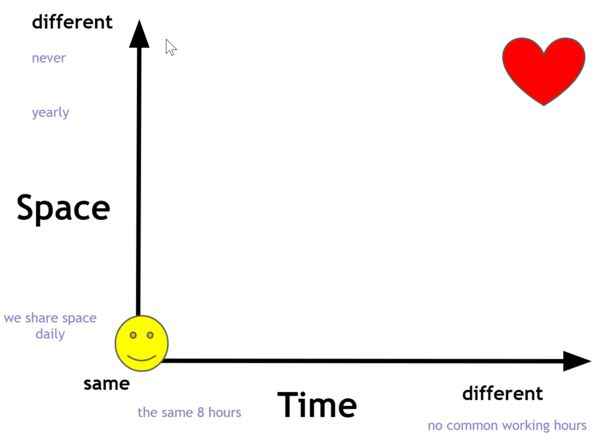I mean, other than avoiding pesky bosses or coworkers that don’t leave you alone.
Introduction
Work at home. At a coffee shop or at a coworking space, when it’s safe to do so again. Even though those three places to do work differ a lot between themselves and we can talk about the differences they have in between them for a while, I wanted first to talk a bit about the differences between working at an office and working remotely, wherever it ends up happening.
Criteria
Here are five criteria that are important to consider when thinking about the differences between working at an office and outside of it.
- Belonging and cohesion: Where you have these two you have trust between team members, where you have trust you have difficult and important questions raised, opinions given and risks taken.
- Communication mode: The way people communicate determines the serendipity, or fortunate discoveries, your team can make as well as the efficiency with which decisions are taken and the amount of documentation your team produces by default.
- Work life balance: The more of it, the happier the workers tend to be, they tend to last longer at their jobs.
- Diversity: Increases available viewpoints and reduces the chance of falling into groupthink.
- Talent availability: Makes it easier to find people with which to grow the team.
Remote work axes
To think about the criteria I like to use two axes, time and space.
- Time: Ranges from having all the team working the same 8 hours every day to not sharing any working hour (as in night versus day shifts.)
- Space: Ranges from having all the team in the same space up to not ever having any team member in the same room with any other.
In both axes we have in between states, like sharing some working hours, or being in the same space weekly, monthly, or yearly.
These axes create a wide spectrum of possibilities, from working all day in the same space to working without ever seeing each other and not even sharing working hours.

The closer we are to the smiley at the origin, the greater:
- Belonging and cohesion: As any military veteran will tell you, sharing the same hard experiences create human bonds like nothing else. Of course in most workplaces you won’t get that level of bonding, but some does indeed appear naturally.
- Synchronous communication: Synchronous is the default way to communicate when we are in presence of each other. Being in the same place at the same time leads to the mythical water cooler conversations which in turn can cause fortuituous discoveries and are difficult to replicate at a distance.
On the other hand, if we are closer to the heart far away from the origin, the better:
- Work life balance: Having a better balance is easier as you are typically able to organize your working hours more freely.
- Asynchronous communication: Given that you are not working at the same time, communication becomes more asynchronous which means, as added benefit, you get lots of documentation which is typically lacking otherwise.
- Diversity and talent availablity: Because you can hire people from more places, not just those people who are willing and able to commute to the office, both diversity and availability increase.
What is this good for?
The axes allow us to somewhat formalize the differences between remote and at-office work and be able to reason and think about jobs based on where they land on these axes. For example we can now ask questions about a job offer we get based on their characteristics. For example
- if we get an offer that’s close to the smiley, ask things like
- What’s work life balance like?
- How much asynchronous communication is done and how it is encouraged?
- How diverse the team is?
- if we get one closer to the heart, we should try questions like
- How is the sense of belonging fostered?
- How does serendipity happen?
- Do you use synchronous communication? When? On which timezone? And what for?
- When was the last time something was discovered by chance?
We can also use the opposite strategy to detect red flags. A remote workplace that requires you to do strict work hours monitored by software would likely impact the work life balance, that’s a red flag you can be aware of now.
We are able to use this framework when making a job post or offer by making explicit how we attack the downsides of where we are on the remote work plane and thus letting candidates know that we explicitly think about the questions raised by how we work and answer them preemptively.
Finally, it can help you know where you would thrive more. Do you need belonging? Would you rather have better work life balance? Did the offer maker put you at ease with how they attack those problems for their circumstances and are they profiting from the benefits of their circumstances?